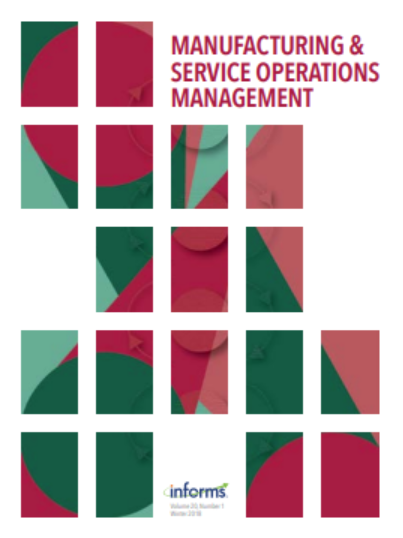Distributional Robustness and Inequity Mitigation in Disaster Preparedness of Humanitarian Operations
IF 4.8
3区 管理学
Q1 MANAGEMENT
M&som-Manufacturing & Service Operations Management
Pub Date : 2023-10-23
DOI:10.1287/msom.2023.1230
引用次数: 4
Abstract
Problem definition: In this paper, we study a predisaster relief network design problem with uncertain demands. The aim is to determine the prepositioning and reallocation of relief supplies. Motivated by the call of the International Federation of Red Cross and Red Crescent Societies (IFRC) to leave no one behind, we consider three important practical aspects of humanitarian operations: shortages, equity, and uncertainty. Methodology/results: We first employ a form of robust satisficing measure, which we call the shortage severity measure, to evaluate the severity of the shortage caused by uncertain demand in a context with limited distribution information. Because shortages often raise concerns about equity, we then formulate a mixed-integer lexicographic optimization problem with nonconvex objectives and design a new branch-and-bound algorithm to identify the exact solution. We also propose two approaches for identifying optimal postdisaster adaptable resource reallocation: an exact approach and a conservative approximation that is more computationally efficient. Our case study considers the 2010 Yushu earthquake, which occurred in northwestern China, and demonstrates the value of our methodology in mitigating geographical inequities and reducing shortages. Managerial implications: In our case study, we show that (i) incorporating equity in both predisaster deployment and postdisaster reallocation can produce substantially more equitable shortage prevention strategies while sacrificing only a reasonable amount of total shortage; (ii) increasing donations/budgets may not necessarily alleviate the shortage suffered by the most vulnerable individuals if equity is not fully considered; and (iii) exploiting disaster magnitude information when quantifying uncertainty can help alleviate geographical inequities caused by uncertain relief demands. Funding: This work was supported by the Natural Sciences and Engineering Research Council of Canada [Grant RGPIN-2016-05208], the National Natural Science Foundation of China [Grants 71971154, 72010107004, 72091214, and 72122015], and the Canada Research Chairs [Grant CRC-2018-00105]. Supplemental Material: The online appendices are available at https://doi.org/10.1287/msom.2023.1230 .人道主义行动备灾中的分配鲁棒性和不公平缓解
问题定义:本文研究了一个需求不确定的灾前救援网络设计问题。目的是确定救灾物资的预先部署和重新分配。在红十字会与红新月会国际联合会呼吁不让任何人掉队的激励下,我们考虑了人道主义行动的三个重要的实际方面:短缺、公平和不确定性。方法/结果:我们首先采用一种鲁棒性满足度量,我们称之为短缺严重性度量,来评估在有限分布信息的情况下由不确定需求引起的短缺的严重程度。由于短缺经常引起对公平性的关注,因此我们提出了一个具有非凸目标的混合整数字典优化问题,并设计了一个新的分支定界算法来确定确切的解决方案。我们还提出了两种确定灾后适应性资源再分配的最佳方法:精确方法和计算效率更高的保守近似方法。我们的案例研究考虑了2010年发生在中国西北部的玉树地震,并展示了我们的方法在减轻地域不平等和减少短缺方面的价值。管理意义:在我们的案例研究中,我们表明(i)在灾前部署和灾后再分配中纳入公平性可以产生更公平的短缺预防策略,同时只牺牲合理的总短缺量;(ii)若不充分考虑公平,增加捐款/预算未必能纾缓最易受伤害人士的短缺;(三)在量化不确定性时利用灾害震级信息有助于缓解因救灾需求不确定而造成的地域不平等。基金资助:加拿大自然科学与工程研究理事会[Grant RGPIN-2016-05208]、中国国家自然科学基金[Grant 71971154, 72010107004, 72091214, 72122015]和加拿大研究主席[Grant CRC-2018-00105]资助。补充材料:在线附录可在https://doi.org/10.1287/msom.2023.1230上获得。
本文章由计算机程序翻译,如有差异,请以英文原文为准。
求助全文
约1分钟内获得全文
求助全文
来源期刊

M&som-Manufacturing & Service Operations Management
管理科学-运筹学与管理科学
CiteScore
9.30
自引率
12.70%
发文量
184
审稿时长
12 months
期刊介绍:
M&SOM is the INFORMS journal for operations management. The purpose of the journal is to publish high-impact manuscripts that report relevant research on important problems in operations management (OM). The field of OM is the study of the innovative or traditional processes for the design, procurement, production, delivery, and recovery of goods and services. OM research entails the control, planning, design, and improvement of these processes. This research can be prescriptive, descriptive, or predictive; however, the intent of the research is ultimately to develop some form of enduring knowledge that can lead to more efficient or effective processes for the creation and delivery of goods and services.
M&SOM encourages a variety of methodological approaches to OM research; papers may be theoretical or empirical, analytical or computational, and may be based on a range of established research disciplines. M&SOM encourages contributions in OM across the full spectrum of decision making: strategic, tactical, and operational. Furthermore, the journal supports research that examines pertinent issues at the interfaces between OM and other functional areas.
 求助内容:
求助内容: 应助结果提醒方式:
应助结果提醒方式:


